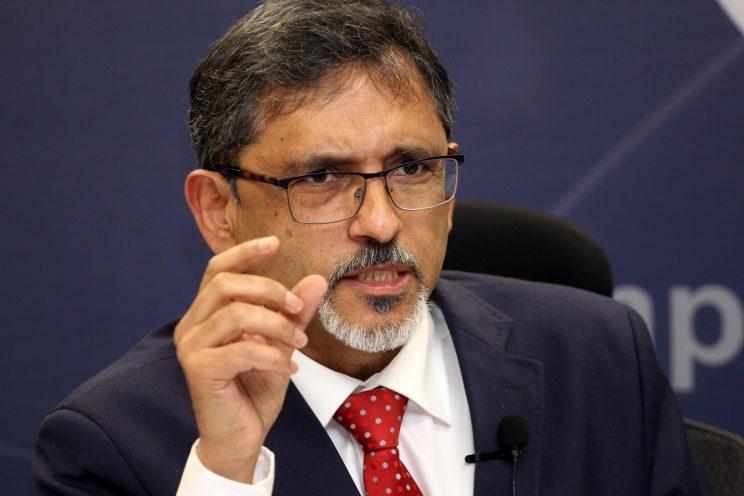Africa-Press – Ghana. Between 20 and 25 new vehicle assembly plants could be established on the African continent if it was able to convert the estimated four million used vehicles imported into Africa each year into new vehicle demand, says Minister of Trade and Industry and Competition Ebrahim Patel.
Africa “is punching below its weight” in producing one million vehicles a year when Africa’s market size is about five million vehicles a year, Patel told the Automotive Forum at the Intra-Africa Trade Fair (IATF) in Durban this week.
Patel said the challenge is that most of those vehicles [sold] are imported second-hand vehicles, which depresses demand.
“Demand is the big driver of the decisions by the big companies, so we want to change that demand equation,” he said.
Patel said Africa has three big vehicle producers – South Africa, Morocco and Egypt – but there is enormous potential in Nigeria and to scale up production in Ghana and a number of countries in East Africa and elsewhere.
He said the manufacturers have set a realistic target of producing five million vehicles a year on the continent.
“That provides an opportunity to build between 20 and 25 massive assembly plants. These completely knocked[-down] plants bring in skilled labour, technology and very demanding manufacturing capabilities. So this can really be a gamechanger for African manufacturing.
“I’m not saying African auto manufacturing, I’m saying African manufacturing because when you can master the disciplines of bringing 5 000 components together into a logistics system and have world class machining capability and assembly capability, you can pretty much make anything else,” said Patel.
Ghana’s Deputy Minister of International Trade Herbert Krapa said Ghana needs a comprehensive national auto development policy to satisfy original equipment manufacturers (OEMs) and this policy needs to ensure access to a huge vehicle market.
He said the policy must also have incentives that make it attractive for OEMs, and there must be the political will to escalate import tariffs to ensure that used vehicles attract higher tariffs.
“Then gradually, by way of an asset-backed financing scheme, people are able to purchase brand new vehicles right there in the market,” said Krapa.
“It’s not always easy. People don’t want to pay higher tariffs but we also have to understand that it has to fit into a broader conversation on the impact these over-age [imported used] vehicles have on the environment.
“But if you are successful in building a domestic auto industry you are also going to reap the benefits that come with that. Our people are buying gradually into that idea. It is a long-term gain,” he said.
Volkswagen, Toyota, Isuzu, Hyundai and Nissan have all already invested in vehicle assembly operations in Ghana.
Read:
Volkswagen SA to start vehicle assembly in Ghana [2019]
Nissan SA driving its parent company’s African transformation strategy
Nigeria’s Director-General of National Automotive Design and Development Jelani Aliyu said stopping used vehicles coming into one’s country is a challenge all across Africa, particularly when the purchasing power of the average African is relatively low.
Aliyu said this makes used vehicles more enticing, but they are detrimental to the development of the industry on the continent.
Aliyu believes Nigeria’s reviewed automotive policy, when finalised, will further discourage the importation of used vehicles and promote the production of cheaper products.
However, he stressed that Africa needs vehicles that are in tune with its culture, climate, terrain and economic structure.
Volkswagen Group South Africa chair and MD Robert Cisek said 75% of its manufacturing output is exported to Europe – and while it is not complaining about this – the problem is that it is not exporting to Africa.
Cisek said Africa has huge potential and Volkswagen SA would like to tap into that potential. He said it is critical to first increase local demand, but imported used vehicles are an issue.
Cisek said addressing used vehicle imports does not mean countries would not have a used vehicle market.
Over time these imports would be continuously replaced by used vehicles from the African continent, he said.
Toyota South Africa Motors (TSAM) president and CEO Andrew Kirby said policy is the building block of the automotive industry in Africa but a lot of other elements are required, including the need for the African Continental Free Trade Area (AfCFTA) to work because it will create scale.
Read: Continental Free Trade agreement will unlock auto opportunities in Africa
Kirby said there is tremendous potential, and if the various stakeholders can agree on issues such as the rules of origin, it will be able to work with countries that want to develop industrial policies and create an auto sector.
This will start with semi-knocked-down (SKD) operations, which is the first stepping point for skills development, together with the start of localising parts, before moving to a completely-knocked-down (CKD) operation “when the scale is there and we can take a natural step towards creating real value on the continent”.
“I think there is tremendous potential to expand quite rapidly over the next five years,” he said.
Mike Whitfield, MD of Nissan’s Africa Regional Business Unit and president of the African Association of Automotive Manufacturers (AAAM), said SKD must be seen as part of the building journey.
“You cannot go from zero to CKD in one go. Demand needs to focus on cutting out used vehicles, access to finance and looking at how we can promote complementary trade of vehicles.
“There is no need for us to build pickups in Egypt if we are building pickups in South Africa. We need to find something else to build there that can come here,” said Whitfield.
“Without doubt SKD has started that journey. It is our intention to progress but it will depend much on how we realise the free trade agreement, individual country policies, and particularly how we grow the size of the market in Africa for Africa,” he said.
Industrial ambition
Patel said Africa has two opportunities, one of which is to set a very low level of ambition and go for SKD production and recognise that most of the value will be added elsewhere in the world.
He said Africa needs to have “ambition beyond that” to have CKD production and to add significantly more value on the African continent.
Patel said the rules of origin for the AfCFTA “are absolutely critical” because they need to reflect the level of industrial ambition.
He said the package required to unlock the opportunity in the AfCFTA involves several elements, including the rules of origin and the importation of second-hand vehicles into African markets.
“We must recognise that we need a programme to progressively eliminate it [the importation of second hand cars]. It can’t be done overnight in one fell swoop but unless we can tackle that we are not going to create the market demand,” he said.
Patel said the third element is for Africa to consider a common external tariff, adding that the AfCFTA is about collapsing internal tariffs between countries on the continent.
“But we also have to capture new vehicle sales for Africa and that means thinking through how we can progressively get towards a common approach to external tariffs with the rest of the world,” he said.
Read: Toyota anticipating SA government support to reduce the price of new energy vehicles
Patel said the fourth element is partnerships on industrial funding, adding that the $1 billion deal announced by the African Export-Import Bank (Afreximbank) can contribute significantly to this.
He said the fifth element involves the big automakers having a common approach towards African leaders and stepping up production on the African continent, and the final element is the role of national programmes.
Patel said countries need to identify where they want to focus.
“We can’t all focus on the same things. We need to find complementarities. South Africa may produce the [Toyota] Fortuner vehicle but another country may do a different Toyota model. Our ability then to get these long runs, to get scale going, is going to be the critical driver of competitiveness,” he said.
For More News And Analysis About Ghana Follow Africa-Press







